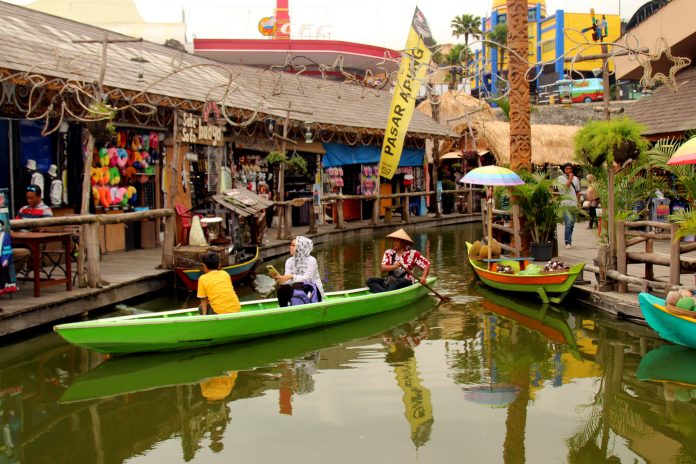As the sixth Sustainable Development Goal (SDG6) gives us 15 years to achieve and maintain universal access to water, it’s easy to call for more infrastructure investments. What’s hard is leveraging funds into success without reliable management systems in place.
Water supply services are more than just physical infrastructure. They involve living institutions. These institutions must increasingly be able to anticipate, absorb and rapidly recover from disruptions, whether climatic, physical, social or economic. Indonesia has begun to appreciate this reality in dozens of small and medium-sized utilities.
Like many middle-income countries, Indonesia has a growing number of smaller cities and towns with rocketing demand for water services. Donors have rightly emphasised the need for pro-poor services within slums of megacities like Jakarta. But they overlook many small- to medium-sized cities that suffer under-performing utilities and can’t meet demand or bounce back from shocks.
So what is a resilient water institution? How will it interact with, and be held accountable to, the people it serves? One study suggests that the secret lies in forging alliances.
Recently, the International WaterCentre–together with Indonesia’s Planning and Development Agency (BAPPENAS) and Water Utility Association (PERPAMSI)–conducted a study. It reviewed small utilities of less than 10,000 connections, seeking ways to improve coordination and decision making capacity between key local water supply stakeholders: the utility, the local government, owner of the utility, and consumer groups.
At this small scale, a typical Indonesian utility struggles to generate enough revenue to pay its workers to respond to the rising demands of leaky pipe networks, water quality monitoring, financial oversight, customer services, planning and management.
To cover operational costs, local utilities can, in theory, negotiate higher tariffs with their government owners. In practice, many lack negotiation skills. They can’t justify why elected officials should support tariff hikes, perceived as against the interests of their constituents.
Their failure leaves institutions and their water services vulnerable to socio-economic unrest, material risks, and political protests. What little external support was available often drifted toward the purely technocratic. Outsiders invested in pumps and pipes, but offered scant funds to unlock sustained improvement in human services.
So rather than pour more money into the infrastructure of under-performing utilities, the Indonesian government took a step back, and took a hard look at the broader environment in which utilities operate.
As it did, it realised that decentralisation of water services has its merits. But too often it left utilities with insufficient and decaying infrastructure, unable to explain either the challenges they face, much less address them.
As a predictable result, dissatisfied customers complained to locally elected officials, who, in a vicious cycle, denied any requests for tariff reforms from the hapless utility. “Why would I pay for a higher unit cost of water,” said one customer, “when it is mostly air that comes out of my tap?”
With bilateral support from Australia, the Indonesian government has begun efforts to build trust between local utility partners, who can then share challenges, risks, and rewards. A supportive environment gives utilities a platform from which to negotiate tariff reforms, if they in turn can demonstrate small but consistent service delivery improvements. This social contract uses a three-stage process–initiation, formalising expectations, and implementing commitments–to discuss, identify and commit to actions towards a shared goal.
Partnership, trust, and accountability: these buzz words shape the universal and integrated nature of the SDGs. They also define resilient institutions, as prerequisites for social contracts. Yet they are too often lost in debates over “the economic pricing of water.”
Indonesia’s social contracts suggest how a partnership process can place trust at the centre of water pricing. Trust secures accountability between the ‘golden triangle’ of urban water actors, binding utility, customers and government. And the study found that the presence of trust was associated with higher adaptive capacity to climatic, economic or social shocks.
Still, trust rarely emerges on its own. Social contracts depend on external ‘honest brokers’ who seed the process and facilitate key steps. Among the leading visionaries for the social contract approach was Pak Nugroho Tri Utomo, BAPPENAS Director for Housing and Settlement. Utomo believed that the “benefits from a social contract process will only be harvested when the process has become ‘auto run’, and when local stakeholders can hold each other to account and there is little need for external facilitation in the process.”
Social contracts have been implemented in twelve unities. They are proving to be an effective framework for building local accountability, and unlocking improvements in service delivery. Scaled up, the approach may prove a significant tool that contributes to resilient service delivery in Indonesia, and beyond.









